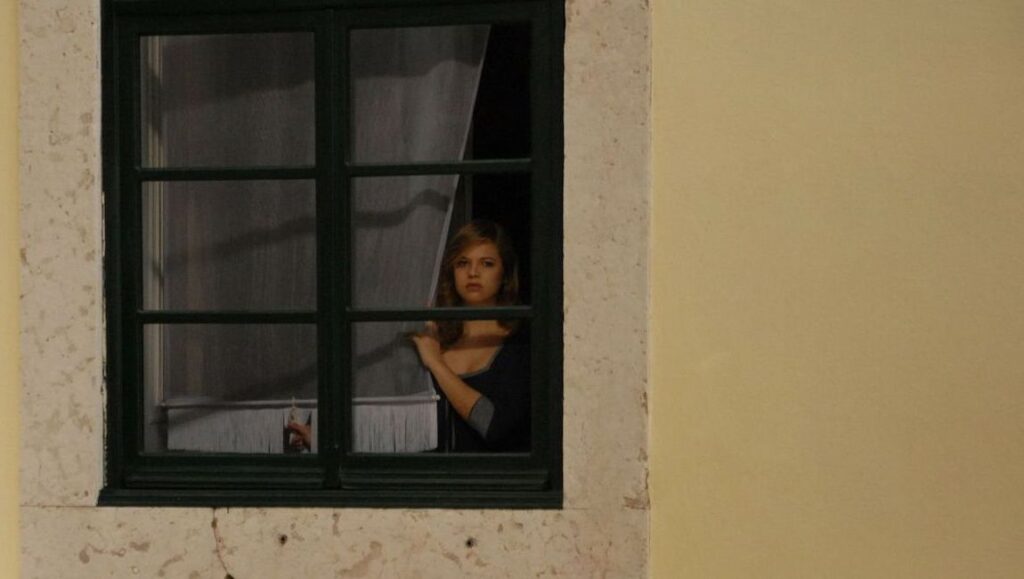Female cinematic incarnations have long played second fiddle to subjective male visions of lust, intoxication, and regret, collectively narrow interpretations that often disavow a woman’s perspective altogether. Arzner, Lupino, Varda, Akerman, Breillat, and Campion have tipped the scales closer to equality, but the terrible fact remains that movies are primarily a man’s world, and women are often relegated to the role of hypnotic window dressing or beautiful furniture. This ongoing discourse makes a singular film like Manoel de Oliveira’s Eccentricities of a Blonde-haired Girl even more essential. Instead of confronting the suffocating male gaze through a dynamic female lead, de Oliveira slowly unveils the fallacies of one man’s memory toward women after a “shocking” event concerning his fiancé sends him into a hyperbolic state. It’s a classic emotional confessional, but one that ends up defining the man’s insecurity and doubt more so than romantic tragedy or loss.
Like many of de Oliveira’s films, Eccentricities begins with the static shot of a scene in motion. A conductor methodically punches tickets aboard a swiftly moving train as the film’s opening credits appear then evaporate while the mechanical ambient sounds flood the cabin. A distressed man named Macário (Ricardo Trêpa) begins a conversation with the inquisitive woman sitting next to him, then proceeds to unload his emotional baggage in vivid flashback. His anguished voice recounts a potentially Noirish tale: while working on the second floor of his uncle’s textile shop, Macário spots a beautiful young blonde named Luísa (Catarina Wallenstein) at the adjacent window and falls in love with her instantly. He divulges in great detail their introduction, courtship, and the familiar obstacles of family, wealth, and fate that stand in their way of happiness. The woman on the train listens intently because, in her words, Macário looks like “an honest lad” and de Oliveira never paints him as anything but.
Macário’s gripping language immediately makes his rapturous description of Luísa feel intense and exciting. De Oliveira paints their introduction in a breathtaking series of POV shots, e.g. Luísa calmly waving a feathery Chinese fan framed by translucent drapes while Macário silently watches in awe from his own office a short distance away. Her suitor lovingly states that “the curtains would have played an interesting role in romances: pinning a flower to them, shaking them to feel a face.” His is a language of adulation for a woman’s surface image, her iconography. A second visual encounter the next day prolongs their flirtation. Luísa hides behind her fan, this time, smiling softly as she pulls down the curtain. Her silhouette leaves Macário speechless, but this is an entirely one-sided cinematic conversation. De Oliveira purposefully leaves the viewer entrenched in Macário’s romantic remembrance, a pattern that will grow more problematic as this young couple’s lives intersect.
What follows is a series of melodramatic pitfalls inhibiting Macário and Luísa’s engagement — classic examples of fate separating young lovers on the cusp of eternal happiness. And then, de Oliveira pulls the rug out from under our feet. After elongated sequences of alternating fits of melancholy and hope, Eccentricities cuts to the heart of male selfishness in a stunning and unforgiving finale. After so much emotional build-up, so much cinematic investment, the walls of Macário’s romantic expectations come crumbling down, not out of jealousy or hatred, but out of embarrassment. His judgments during this final sequence reveal just how little Macário understands Luísa; he dissects his “trusting” memory of her in half. De Oliveira finalizes this indictment with a haunting and ambiguous final shot of a woman on the verge of interior collapse, a moment Macário will never contemplate.
It’s possible that only a master filmmaker like de Oliveira could so thoroughly unveil this sort of complex scenario in such brilliantly reserved strokes. As a piece of fluid cinematic observation, Eccentricities uses spatial beauty and fragmented temporality to construct a short but damning Achilles heel for a male character convinced of his own sanctity. On a train, at a windowsill, or walking down the street, Macário and the men of Cinema often miss the forest for the trees. Eccentricities addresses this issue wonderfully, tapping into the palpable panic our filmmaking forefathers continuously shovel onto women in romantic scenarios, then flips it to reveal the male insecurity pulling the puppet strings. In Macário’s eyes, Luísa’s great sin isn’t that she’s eccentric or even strong, but that she’s able to exist completely outside the realm of his fantasy. For an insecure romantic grasping at straws, this is tragically beyond comprehension.


Comments are closed.